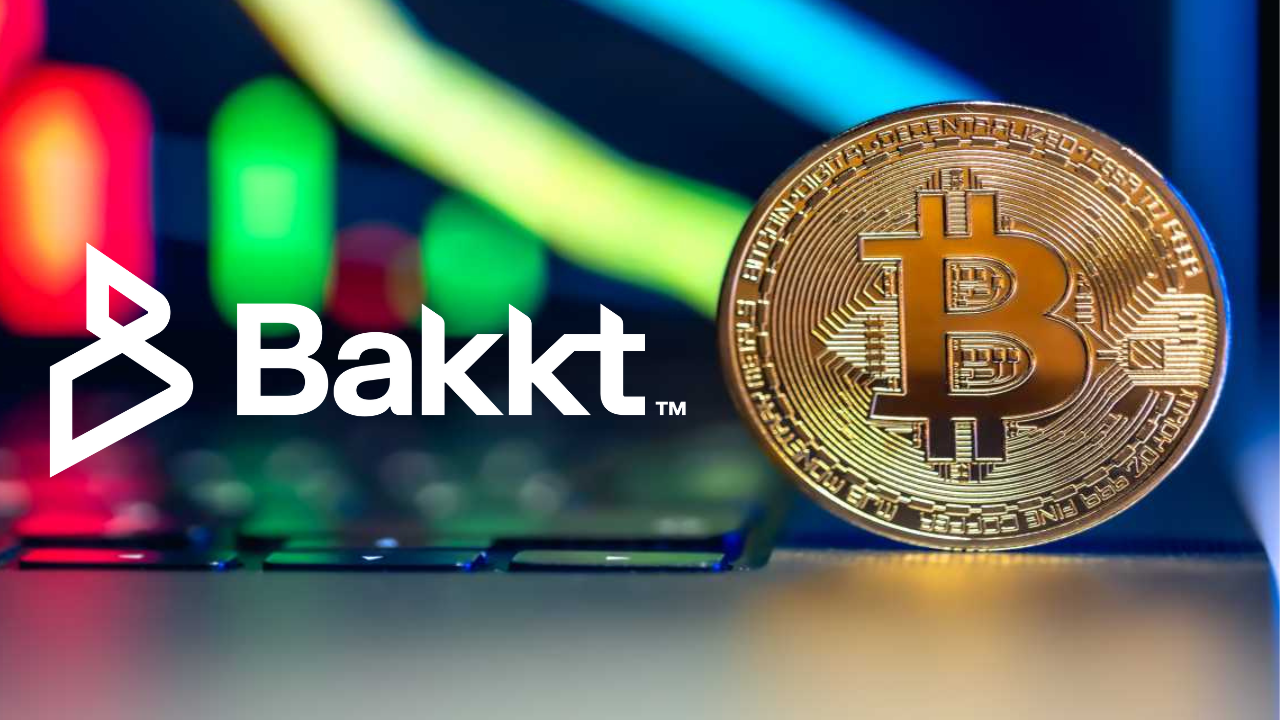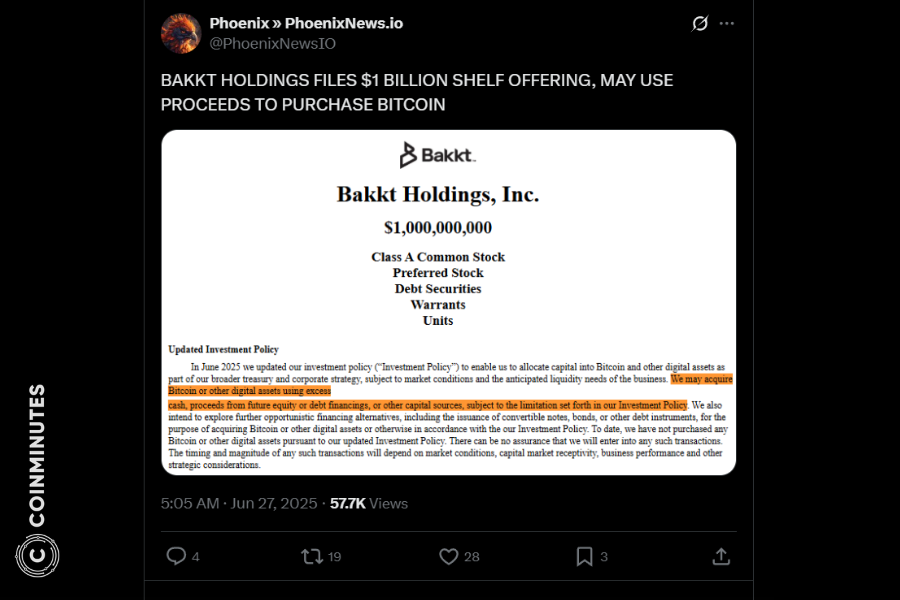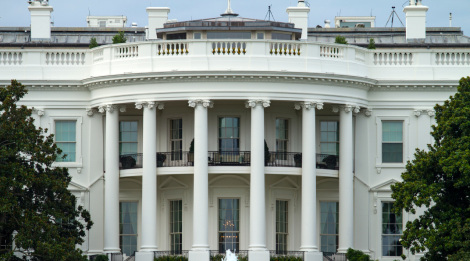Bakkt Plans to Raise $1 Billion to Build Bitcoin and Digital Asset Treasury

Bitcoin just got a powerful new corporate ally. On June 27, crypto exchange Bakkt unveiled plans to raise $1 billion specifically to load up on Bitcoin and other digital assets for its corporate treasury.
Why should you care? Because when public companies start treating Bitcoin like strategic financial reserves instead of speculative tech, everything changes.
What's Bakkt Really Up To?
Bakkt isn't messing around.
The New York-based company filed SEC paperwork stating every dollar raised will fund cryptocurrency purchases. Not some of it. Not most of it. All of it. This stems directly from their "Expanded Investment Policy" announced on June 10.
But how exactly are they pulling this off?
Instead of a traditional one-time offering, Bakkt is using what's called a shelf registration statement (Form S-3). Think of it as a financial buffet card – they can sell different securities whenever conditions look good over the next three years.
"Up to 100% of the net proceeds" will go toward Bitcoin and digital assets, according to their SEC filing. With Bitcoin currently hovering around $107,000, a full billion dollars translates to approximately 9,364 BTC.
Here's the kicker – Bakkt hasn't purchased a single Bitcoin yet. Zero. They're copying homework from companies like MicroStrategy, Semler Scientific, and Metaplanet. Their latest quarterly report reveals troubling vital signs: revenue down 30% with persistent operational losses dragging them down.
Many analysts see right through this Bitcoin treasury move.
"This looks like a company trying to rebrand itself as a crypto investment vehicle because its core business is struggling," says one Wall Street analyst who requested anonymity. "It's like putting a Tesla sticker on a broken-down Ford Pinto."

The Bitcoin Balance Sheet Revolution
Bakkt isn't alone in this gold rush. Not even close.
Have you noticed how many corporate treasurers suddenly fancy themselves Bitcoin strategists? As of July 2025, public companies worldwide have parked an estimated $93 billion in Bitcoin on their balance sheets. That's roughly 4% of Bitcoin's entire supply now sitting in corporate treasuries.
The undisputed heavyweight champion? MicroStrategy.
Under Michael Saylor's relentless leadership, the business intelligence firm has transformed into a Bitcoin acquisition machine, amassing a staggering 597,325 BTC. That's over $63 billion worth, representing more than 2.8% of all Bitcoin that will ever exist.
But other corporate players have joined the party:
-
Metaplanet keeps steadily adding to its 15,555 BTC through disciplined monthly purchases.
-
Tesla still clutches its original 11,509 BTC acquired during the 2021 buying spree.
-
Semler Scientific despite holding just 4,636 BTC currently, they've announced plans to accumulate a mind-boggling 105,000 BTC by 2027.
Where does Bakkt fit in this new landscape? If they successfully deploy their billion-dollar war chest, they'd instantly secure a position as the fifth or sixth largest corporate Bitcoin holder globally. Not too shabby for a company that's reinvented itself more times than Madonna.
From Ambitious Startup to Bitcoin Believer
So how did Bakkt end up here? The journey has been anything but smooth.
Born in 2018 under the powerful umbrella of Intercontinental Exchange (ICE) – yes, the same company that owns the New York Stock Exchange – Bakkt launched amid enormous hype. Their mission? Create a regulated Bitcoin futures trading platform that would bring institutional investors flooding into crypto.
It bombed. Hard.
So they pivoted toward tokenization solutions and digital asset custody services. But adoption proved challenging, forcing several strategic shifts. This Bitcoin treasury initiative represents yet another reinvention as Bakkt frantically searches for solid ground in the shifting crypto landscape.
Then there's the political intrigue.
Bakkt's first CEO, Kelly Loeffler, jumped ship in 2019 to become a U.S. Senator from Georgia during the Trump administration. But the Trump connections run deeper.
Remember those explosive headlines last November? Trump's Truth Social was reportedly in serious negotiations to acquire Bakkt outright. The deal collapsed, but it revealed something significant: Bakkt appears to be firmly on Trump's radar as he crafts his approach to digital assets.
"The failed acquisition talks suggest Bakkt was meant to play some role in Trump's broader crypto strategy," explains a DC-based policy analyst. "Even though the deal fell through, the courtship itself speaks volumes."
Why Now? The Timing Isn't Random
Bakkt's billion-dollar Bitcoin move comes at a strategic moment.
The GENIUS Act recently cleared the Senate, and while it primarily addresses stablecoin regulation, it creates clearer guidelines for companies interested in holding digital assets.
But that's just part of the story.
The explosive success of spot Bitcoin ETFs has fundamentally changed Bitcoin's institutional status. In 2025 alone, these ETFs have attracted a staggering $14.4 billion in net inflows, with BlackRock's IBIT leading the charge.
Why does this matter for corporate treasuries? Because it removes a major adoption barrier.
"Three years ago, a CFO suggesting putting a billion dollars in Bitcoin would've been laughed out of the boardroom," explains financial analyst Maria Rodriguez. "Today? It's a legitimate treasury management strategy backed by major institutional precedent."
The path has been paved by early adopters, making Bakkt's billion-dollar ambition seem almost conventional in 2025.
The Promise and Peril of Bitcoin Treasuries
Why would any responsible company put Bitcoin on their balance sheet?
Companies diving into Bitcoin treasury strategies typically cite four key motivations:
Protection against inflation and currency devaluation. When money printers go brrr, Bitcoin offers potential shelter.
Potential for massive asset appreciation. A billion dollars in Bitcoin could become two billion, three billion, or more if historical patterns continue.
Strategic diversification beyond traditional cash reserves. Why keep all your eggs in the fiat basket?
Market differentiation and premium valuation. Bitcoin on the balance sheet can make your stock more attractive to certain investors.
But let's get real about the risks. They're substantial.
Bitcoin's wild price swings can wreak havoc on quarterly earnings reports. A 20% drop in Bitcoin's price could suddenly wipe hundreds of millions from a company's balance sheet, triggering investor panic.
And companies that morph into Bitcoin holding entities face a fundamental question: Why should their stock trade above the value of their Bitcoin holdings? What's the premium for?
For Bakkt specifically, the dangers run deeper. Their recent financial reports raise legitimate "going-concern" questions about the company's future. Is this Bitcoin treasury initiative truly a strategic pivot, or merely financial engineering to prop up a failing enterprise?
"It feels like a company trying to ride the Bitcoin wave rather than fix its fundamental business problems," notes crypto analyst Jake Williams. "Buying Bitcoin won't magically fix broken business models."
The jury's still out on whether Bakkt truly believes in Bitcoin as a treasury reserve asset, or if this is simply a desperate attempt at financial alchemy.
The Great Corporate Bitcoin Race
A full-blown corporate Bitcoin arms race is underway.
If Bakkt succeeds in raising and deploying their billion dollars, they'll instantly become one of America's largest corporate crypto holders. But they're far from alone in this gold rush.
As the GENIUS Act progresses through Congress and companies like Metaplanet and Semler Scientific expand their holdings, Bitcoin treasury announcements are becoming almost routine. Just last month, three public companies announced new Bitcoin allocation strategies.
Wall Street has even coined a new term: "Bitcoin treasury companies." Similar to how gold mining stocks serve as proxies for gold prices, these corporations offer investors indirect Bitcoin exposure through traditional brokerage accounts, often with actual operating businesses attached.
Need convincing this trend is real? When Semler Scientific announced its ambitious plan to acquire 105,000 Bitcoin by 2027, its stock price catapulted nearly 40% in a single week.
That kind of market response gets boardroom attention. Fast.
What does this all mean? In today's market, Bitcoin on your balance sheet might be worth more than actual business success. It's a stunning reversal of traditional corporate finance principles.
What Happens Next?
Bakkt's billion-dollar Bitcoin plan reveals a simple truth: companies are racing to "Bitcoinize" their treasuries before competitors beat them to it.
Industry forecasts predict corporate Bitcoin holdings could exceed 1 million BTC by the end of 2026 – representing nearly 5% of the total supply. As the asset matures and volatility gradually decreases, this adoption curve will likely accelerate.
For Bakkt specifically, this strategy represents both tremendous opportunity and last-ditch desperation. Success could provide a much-needed lifeline and completely redefine their market position. But acquiring Bitcoin won't magically fix the fundamental business challenges that have plagued the company since its inception.
As more companies allocate significant portions of their cash reserves to Bitcoin, they're collectively betting on a future where digital assets form the foundation of a new financial system.
The question isn't whether more companies will follow Bakkt's lead – it's how quickly they'll do it, and whether Bitcoin can possibly live up to these extraordinary expectations.
Will your company be next to join the Bitcoin treasury revolution? The clock is ticking.
 English
English
 Vietnamese
Vietnamese











